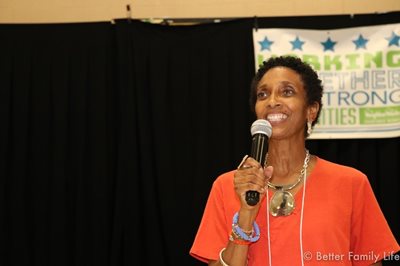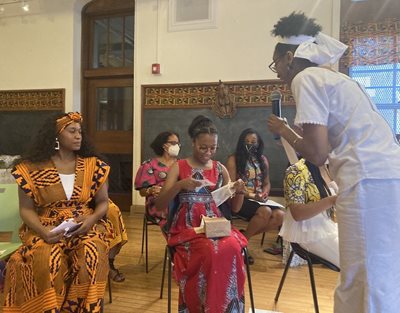Culture and arts are often considered luxuries for the people that Better Family Life helps and empowers, says DeBorah Ahmed, co-founder and vice president of Cultural Arts at the NeighborWorks network organization. They shouldn't be. That's why culture plays a big part in what they offer the community – and has since they first formed 39 years ago.
"Coming back to St. Louis for me and seeing some of the conditions prevalent among African Americans in the urban core was devastating and depressing and disappointing," says Ahmed, who, with her husband Malik, founded Better Family Life in the basement of their home.

"How could we address what we were looking at? We'd both come from a philosophy of uplifting Black folks and empowering Black folks and showing love for Black people. We wanted to contribute to the improvements."
Those improvements came by way of housing and education. Many also came in the cultural activities that help build community. The Ahmeds placed the values put forward by Maulana Ndabezitha Karenga, creator of Kwanzaa, at the center of their nonprofit. The holiday promotes seven principles of African heritage including UJIMA, the work of building and maintaining a community together. Better Family Life launched with a Kwanzaa community celebration that continues today. Other touchstones are Black Dance-USA: A Celebration in Movement and the Unity Ball.
"We tell our story so we can remind ourselves of who we are and what we do," Ahmed explains. That includes hosting marketplaces highlighting Black-owned businesses and entrepreneurship, community festivals, movies about Black life and more.
Across the NeighborWorks network, more than a third of network organizations have reported

That's why, as a dancer and dance instructor, Ahmed says cultural celebrations are a big part of what they do. To engage in culture is to tell the story "of how people see their place in the world, what that means. You use your history and your tradition and your ethos to help inform who you are and what you're going to do. When you talk about community development, you need to think: Who are the people in that community? What has enriched that community of people? What brings joy?"
Ahmed describes activities like dance as "feeding the soul." The nonprofit's activities attract people from different income brackets and backgrounds. They have housing programs, community outreach and engagement activities, youth programs, and work force services including placement and retention. "Our priority is doing all we can to improve the lives of African Americans in any way we can, and we work with anyone who comes to us for assistance." She estimates – across many sectors and programming – they've reached close to 2 million people in their 39 years.
One of those people is Ominira Chiquita Camille, a writer, actress and occupational therapist now living in New York. Camille signed up for her first Afrikan dance class after finding Black Dance-USA. "DeBorah was my teacher. I had been a modern dancer, but it didn't move me the way this did, incorporating your body and history with each dance." She later joined Ahmed's dance company and volunteered with Better Family Life. "We were trying to present and grow for the Black community, starting with families and reaching out from there. It was vital for me," she says. "We worked out of a love for our people."
Malena Amusa also found strength and connection through dance and the Kwanzaa expo, which introduced her to books she couldn't find elsewhere and connected her to "a global consciousness. There was a world outside of St. Louis, a movement I could be a part of," she says. She learned about nurturing her health and wellness and she, too, volunteered with the program. "It's given me a full spectrum view of what community empowerment looks like. It's targeting individuals with what they need to feel safe and nourished – economically, socially and culturally."

